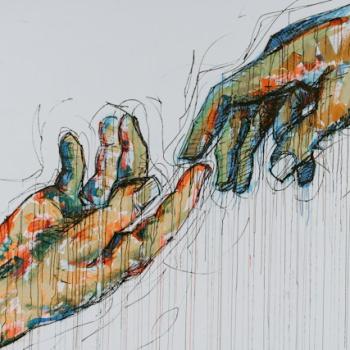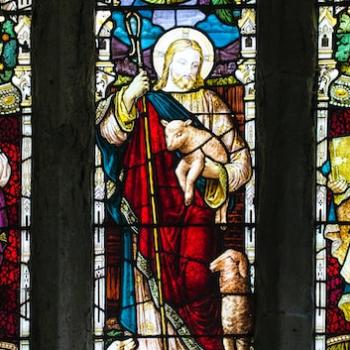The first Sunday in Lent tempts us to question what temptation is all about in the first place.

I have very little willpower. If I’m on a diet and you give me a slice of pie, I’ll ask for seconds. And if I’ve overspent my budget when asked to travel abroad with a friend, I’ll pack my bags. If I’m exercising when I get a notification that a new season of Only Murders in the Building has dropped, the only lunges I do are the kind that lead me to the remote.
40 Days in the Desert
Much ink has been spilled commenting on the allegorical tale in the gospel reading for the first Sunday in Lent in which Satan tempts Jesus. Mark’s version in Cycle B reports that Jesus was tempted in the desert. Matthew’s version in Cycle A and Luke’s in Cycle C are more detailed, each showing Satan present Jesus with three specific temptations.
The symbolism is rich. There is a direct parallel between Jesus’ exchange with Satan and Peter denying Jesus three times before his arrest, and the significance of “40 days” could not be more clear. In the Old Testament, it rained 40 days and 40 nights when Jonah was on the ark, and the Israelites wandered the desert for 40 years.
I don’t believe in a literal Satan nor that the 40 days and 40 years in Scripture are historically accurate. But I think there is a great deal of symbolic truth in these stories. The temptations represent things we all long for in one way or another: satisfaction for our physical needs, freedom from suffering, and control over the world around us.
The Cliff Notes Version of Longing
I think everything we long for falls into one of these three categories. Everything. Want a new job? It’s probably because we want to be able to provide for our families, avoid the dissatisfaction of boring or ill-fitting work, and have some control over how we spend our time.
Longing for that winning lottery ticket? It’s probably because we want to have the means to fill any need for ourselves or those we love. We want to pay for the care and conditions that alleviate our suffering, and call the shots in any number of contexts.
That which we long for is a function of who we are. A person who longs for enough food to eat – literally or figuratively – fears scarcity. Another who longs for a free pass on suffering fears pain. Yet another who longs for control fears the unknown.
Hammers and Nails
Abraham Maslow, and others before him, wrote some version of this maxim that I paraphrase: If all you have is a hammer, then everything looks like a nail. The story of Jesus’ temptation is one of competing worldviews. If all you know is fear, then everything seems like a threat.
Satan offered Jesus this fear-based understanding of life. In presenting food when he was hungry, he offered a worldview based on scarcity in which life is a competition for limited resources. By rejecting this offer, Jesus chose a worldview based on abundance, not fear.
In daring him to jump from the parapet of the Temple without injury, Satan offered him a worldview in which suffering has no place. By rejecting this offer, Jesus chose a life that accepts pain as a given rather than something external from it.
In serving up dominance over all the world’s kingdoms, Satan offered him a worldview in which power and control are the way to protect oneself from the unknown. By rejecting this offer, Jesus chose a view of life in which everything – no matter how good or bad – is welcomed rather than feared.
If all we have is a hammer, then all we’ll see are nails. If fear is our default setting, then life is merely a struggle to continually hedge our bets against the boogie men hiding behind every corner.
How exhausting.
The Only Thing to Fear Is Fear Itself
If Jesus said it once, he said it about 400 times – do not be afraid. The opposite of fear isn’t certainty or confidence; it’s faith. Faith is a different ball game altogether. Faith means believing that abundance eventually wins out over scarcity, that pain plays a part in every life’s story, and that the unknown is a friend, not a foe.
I think the message of the first Sunday in Lent is simply to remember who we are. If we come from God, live in God, and return to God in whatever form that takes, then there’s nothing to be afraid of, is there? A hammer sees only nails. A life based on fear sees only potential harm. I think Jesus’ invitation this week is compelling. The first step on the journey to Easter is to reject the temptation to make fear our default setting.












